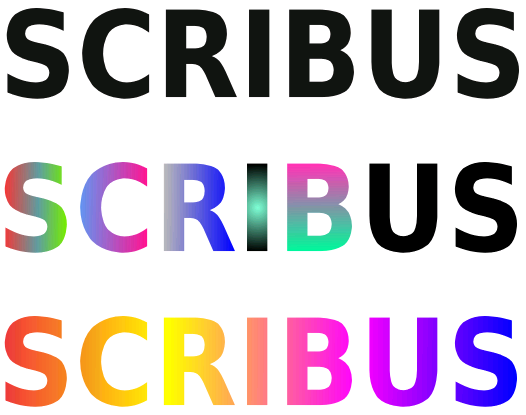Text Gradients: Difference between revisions
Jump to navigation
Jump to search
m (added to Category:HOWTO) |
m (update) |
||
| Line 1: | Line 1: | ||
[[Category:Tips]] [[Category:HOWTO]] | [[Category:Tips]] [[Category:HOWTO]] | ||
This is a brief article explaining how to take text and fill it with gradient colors. | This is a brief article explaining how to take text and fill it with gradient colors. | ||
| Line 10: | Line 9: | ||
# Now click each one and use the gradients in ''Properties > Colors'' as desired. If you do not ungroup, you can choose different colors for each letter, but there will be one kind of gradient possible for all letters – you may need to click outside the group, then back to the next letter to switch from one letter to the next. | # Now click each one and use the gradients in ''Properties > Colors'' as desired. If you do not ungroup, you can choose different colors for each letter, but there will be one kind of gradient possible for all letters – you may need to click outside the group, then back to the next letter to switch from one letter to the next. | ||
* In the bottom example, we have made one continuous gradient across all the letters – this is a four-color gradient, going from red to yellow to magenta to blue. After step 1 above, ''Convert To > Outlines'', we have then clicked ''Item > Combine Polygons'', so that then you can make one large gradient over the entire collection of combined letters. | * In the bottom example, we have made one continuous gradient across all the letters – this is a four-color gradient, going from red to yellow to magenta to blue. After step 1 above, ''Convert To > Outlines'', we have then clicked ''Item > Path tools > Combine Polygons'', so that then you can make one large gradient over the entire collection of combined letters. | ||
For some tips on putting images in text, check [[How to fill a Scribus text with an image]], and for hints on text over images see [[Text over images]]. | For some tips on putting images in text, check [[How to fill a Scribus text with an image]], and for hints on text over images see [[Text over images]]. | ||
If you need more help with gradients and the color tab, check [[Color Tab and Gradients]]. | If you need more help with gradients and the color tab, check [[Color Tab and Gradients]]. | ||
Latest revision as of 08:22, 12 November 2013
This is a brief article explaining how to take text and fill it with gradient colors.
Here are three sets of text. The top shows the text in a text frame, then two copies were made and positioned below.
- Select the frame then click Item > Convert To > Outlines, or use the Context menu Convert To > Outlines. This converts each letter to an outline (in other words, a shape), and also groups the letters.
- You will need to select this group (click on it). In the middle example, we are trying to make individual gradients in each letter, so we then click Item > Ungroup to separate the individual letters.
- Now click each one and use the gradients in Properties > Colors as desired. If you do not ungroup, you can choose different colors for each letter, but there will be one kind of gradient possible for all letters – you may need to click outside the group, then back to the next letter to switch from one letter to the next.
- In the bottom example, we have made one continuous gradient across all the letters – this is a four-color gradient, going from red to yellow to magenta to blue. After step 1 above, Convert To > Outlines, we have then clicked Item > Path tools > Combine Polygons, so that then you can make one large gradient over the entire collection of combined letters.
For some tips on putting images in text, check How to fill a Scribus text with an image, and for hints on text over images see Text over images.
If you need more help with gradients and the color tab, check Color Tab and Gradients.
